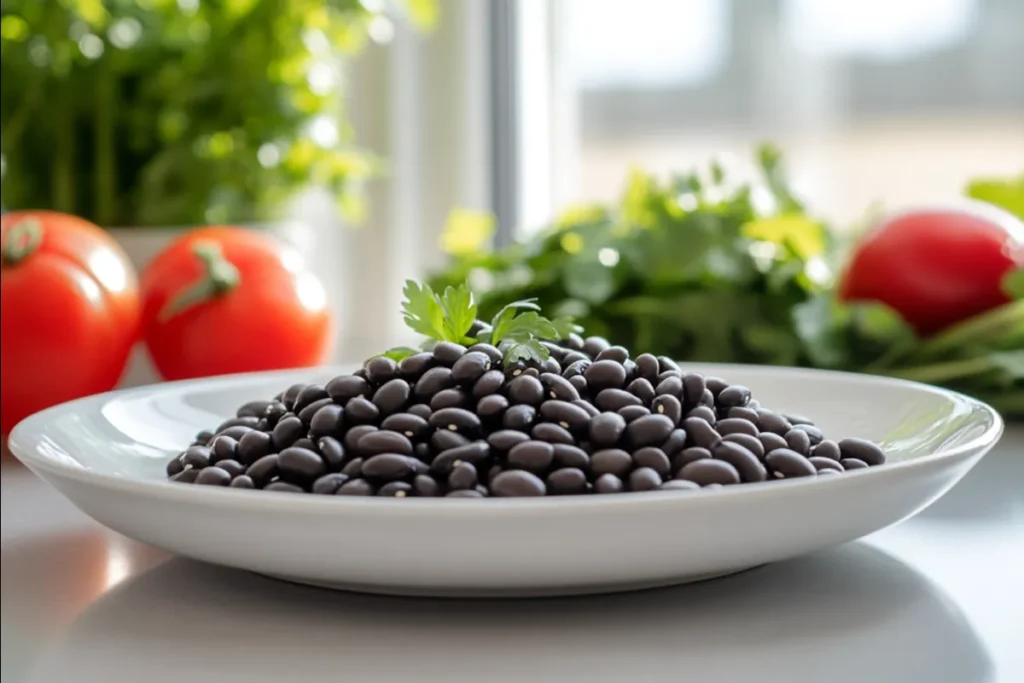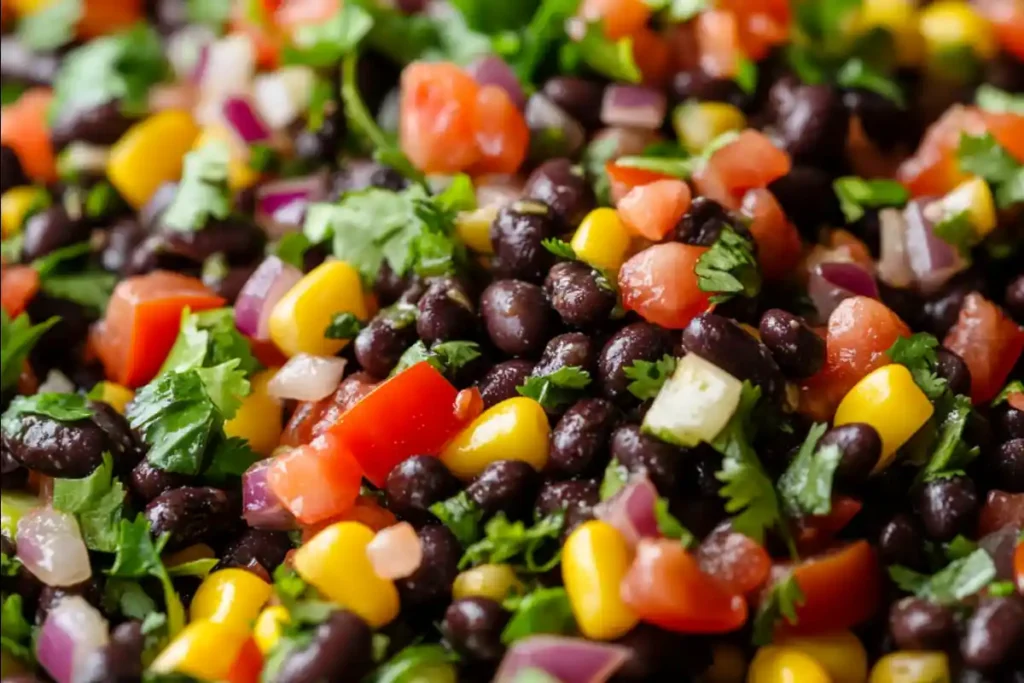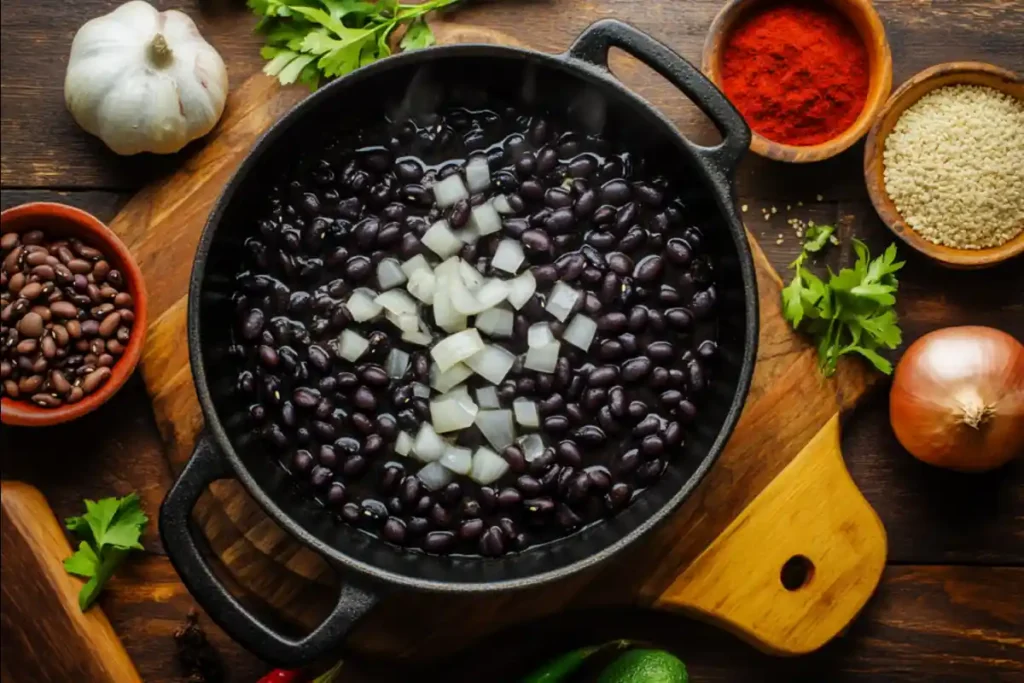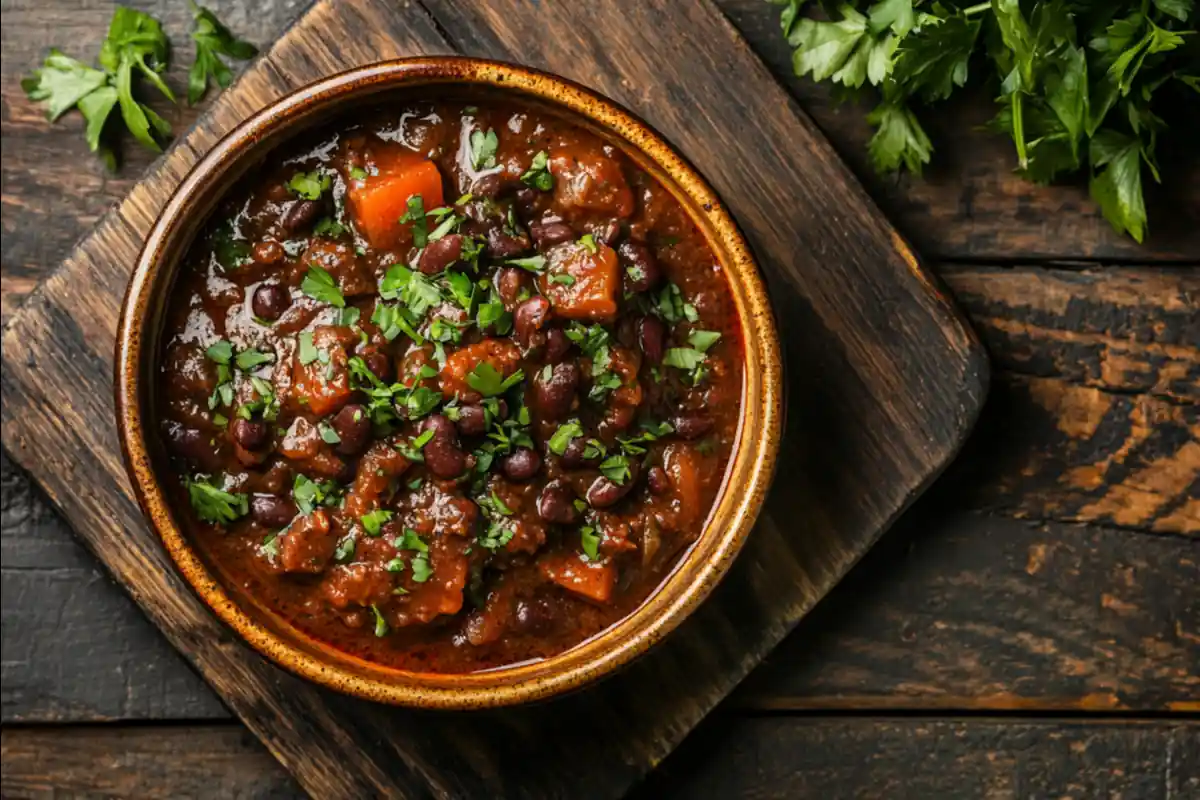A thorough examination of black beans at Chipotle and how they stack up nutritionally.
Chipotle’s menu features many popular components, but many people ask: Are black beans at Chipotle healthy? In this article, we will analyze the nutritional content of these beans, their potential advantages, and how they factor into a balanced meal. You will learn about caloric details, tips for healthier customization, and reasons black beans matter for both flavor and well-being.
Browse Harvard T.H. Chan School of Public Health’s guidelines on legumes if you want to see how beans fit into a varied diet. Additionally, you can find helpful advice on cooking beans at The Bean Institute, which outlines best practices for maximizing flavor and texture. Afterwards, you might explore USDA’s MyPlate site for more resources on building balanced meals with legumes, grains, and proteins.
Altogether, black beans are an appealing plant-based option in many Chipotle orders. Albeit overshadowed by protein choices like barbacoa or chicken, they remain an essential building block. With their rich flavor and robust nutrient profile, it’s no surprise many diners incorporate them. In the upcoming section, we will uncover why black beans deserve the spotlight among Chipotle’s various menu items.
Why Black Beans Deserve the Spotlight
Black beans have been a cherished food for centuries, particularly in Latin American cuisine. They are nutrient-dense and usually affordable, giving them broad appeal. Moreover, they taste delicious in numerous dishes, including burritos, bowls, soups, and salads. Because black beans are versatile, they adapt easily to a variety of diets.
Comparatively, some customers may think pinto beans or refried beans are the default for burritos, but black beans have gained traction for their smoky sweetness and pleasant texture. Certainly, these beans provide more than just flavor. Their fiber, protein, and micronutrients support overall health. Additionally, they often remain a prime choice for vegans or vegetarians at fast-casual spots like Chipotle. Moving to the next part, let’s explore how Chipotle’s broader emphasis on fresh, quality ingredients supports black beans’ popularity.
Chipotle’s Emphasis on Fresh Ingredients
Chipotle prides itself on “Food with Integrity,” a motto highlighting quality sourcing. That approach means fresh vegetables, real spices, and, of course, well-cooked beans. Therefore, it’s no wonder the brand invests time in perfecting their black bean recipe. Because these beans form a staple in burritos, bowls, and even side servings, they must maintain consistent taste.
Additionally, Chipotle’s presence across the United States means they need reliable suppliers. Farmers who produce top-tier black beans help the brand deliver that classic, hearty taste. In the subsequent chapter, we’ll pinpoint the bean variety they typically use, so you can understand exactly what you’re eating at this beloved chain.
What Exactly Are Chipotle’s Black Beans?
Chipotle’s black beans are, in most cases, black turtle beans. They are known for their firm yet creamy texture once fully cooked. Identically, you might find these beans in many groceries labeled simply as “black beans.” The brand ensures these beans are ethically sourced, aligning with the brand’s focus on sustainable practices.
Additionally, Chipotle seasons the beans with onions, garlic, and a sprinkling of spices such as cumin or oregano. This straightforward cooking process keeps the bean’s natural flavor intact. Despite being used in large-scale restaurant settings, the brand attempts to preserve a homemade feel. If you have tried black beans from a can at home, you may notice some differences. Yet, the brand’s beans aim to capture a similar essence with an extra layer of slow-cooked flavor. Advancing to the following area, let’s delve deeper into the nutritional breakdown of Chipotle’s black beans.
Analyzing the Nutritional Profile

When people ask, Are black beans at Chipotle healthy? they usually refer to calorie counts, macronutrient ratios, and micronutrient content. Let’s break it down.
- Protein: Black beans boast about 7–8 grams of protein per half-cup serving. That helps with muscle repair and satiety.
- Fiber: Expect around 5–7 grams of fiber in a similar portion size. Fiber supports gut health, lowers cholesterol, and regulates blood sugar.
- Carbs: Beans contain mainly complex carbohydrates, delivering sustained energy. The total ranges from about 15–20 grams per half-cup.
- Vitamins and Minerals: Black beans provide iron, magnesium, folate, and potassium. They also include smaller amounts of vitamins like B6 and thiamine.
- Fat Content: Typically, beans are low in fat, with just a trace of healthy unsaturated fats.
However, note that Chipotle’s beans may have extra sodium compared to plain beans cooked at home. The chain uses salt to enhance flavor, and each restaurant location aims to maintain consistent taste. In the next installment, we’ll detail how these nutritional metrics translate into real-world health benefits.
Key Health Benefits
Are black beans at Chipotle healthy? Let’s see why so many people consider them a top pick.
- Heart Health
- Black beans offer soluble fiber, which can reduce cholesterol levels.
- High potassium content supports healthy blood pressure.
- Their complex carbs help manage blood sugar, reducing stress on the circulatory system.
- Digestive Support
- Fiber fosters a healthy gut microbiome.
- Regular bean intake can encourage better digestion and prevent constipation.
- Many nutritionists recommend beans to regulate bowel movements and overall gut function.
- Weight Management
- Protein and fiber lead to increased satiety, so you may feel fuller after a bean-heavy meal.
- Substituting beans for red meat can help reduce daily caloric intake.
- Beans contain fewer calories than many meat or cheese toppings, so they help lighten meals.
- Nutrient Density
- Each serving packs essential vitamins and minerals.
- Folate is especially valuable for cell maintenance and development.
- Iron helps ward off fatigue and supports oxygen transport in the body.
Nevertheless, factors like overall meal composition and portion sizes matter. Beans alone can’t guarantee health if you overindulge in high-fat items. In the ensuing segment, we will look at portion sizes and caloric implications for people who frequent Chipotle.
Serving Sizes and Calories
Chipotle typically gives you a scoop of black beans, which equals roughly half a cup. That portion contains around 110–130 calories, though this can vary slightly. Therefore, if you’re building a bowl with double beans, you might be looking at 220–260 calories from beans alone. However, that might be fine if you’re aiming for a plant-based protein source.
Here’s a simple breakdown you might see:
- One serving: ~120 calories, ~7g protein, ~5–7g fiber
- Two servings: ~240 calories, ~14g protein, ~10–14g fiber
Moreover, the rest of your Chipotle order, like rice, cheese, guacamole, or sour cream, influences the total calorie count. If you want to keep the meal lighter, you can skip the cheese or opt for a half-portion of guacamole. Beans themselves remain a moderate-calorie item, especially compared to higher-fat meats or sugary beverages. In the next phase, we’ll compare these black beans to other beans and proteins at Chipotle.
Comparisons with Other Beans and Protein Sources
At Chipotle, you typically face a choice between pinto beans or black beans. Are black beans at Chipotle healthy? They sure are, but pinto beans also offer similar nutritional benefits. If you compare them side-by-side:
- Black Beans: About 7–8g protein, 5–7g fiber, 110–130 calories per 1/2 cup
- Pinto Beans: Similar protein and slightly fewer calories, but flavor and texture differ
Consequently, pinto beans can taste creamier, while black beans deliver a firmer bite. Moreover, you can skip beans and select a meat option, like chicken, steak, or carnitas. Yet, these proteins often carry more fat and potentially higher sodium. Conversely, black beans help keep your meal plant-based and lower in total fat, though they do add carbs. In the upcoming section, let’s address potential health concerns and possible misconceptions about black beans at Chipotle.
Potential Health Concerns and Misconceptions
- Sodium Levels
- Chipotle’s black beans contain salt for flavor.
- High sodium intake can cause water retention or raise blood pressure.
- You can reduce sodium by asking for a lighter portion of beans or mixing them with fresh, unsalted veggies.
- Oil Usage
- The chain may use oil or other fats to cook beans.
- Typically, the amount is moderate. However, it might impact total fat content.
- If you want to watch your fat intake, skip sour cream and cheese.
- Allergens and Cross-Contamination
- Beans at Chipotle are generally free of major allergens like dairy or gluten.
- Still, there’s a chance of cross-contact on the service line.
- If you have a severe allergy, let staff know so they can change gloves or use fresh utensils.
- Are Black Beans at Chipotle Healthy When Smothered in Toppings?
- The beans themselves are nutrient-dense.
- Excess cheese, queso, or sour cream adds saturated fat.
- Use guacamole or fajita veggies to boost healthy fats and fiber.
Henceforth, black beans themselves are generally healthy, but your entire meal composition matters. In the next installment, we’ll discuss how to tailor your Chipotle order if you’re health-focused or follow specific dietary guidelines.
Dietary Customization at Chipotle

Adding or Skipping Toppings
If you’re counting calories, skip the cheese or request a light sprinkle. You can also ask for less rice or even half beans. This approach keeps carbs and total calories manageable. Meanwhile, loading up on veggies and salsa ensures nutrients without a big calorie jump. Another strategy is to pick a small scoop of guacamole for healthy fats and skip less wholesome options.
Creating Balanced Bowls and Burritos
Balance is key. A typical burrito might include beans, rice, meat or sofritas, salsa, cheese, and sour cream. This combination can climb to 1,000 calories or more if portion sizes are large. Instead, ask for half rice and extra lettuce to lighten the carb load. Using black beans as the main protein source is a wonderful idea for vegetarians or people who prefer more plant-based meals.
Strategies for Vegans, Gluten-Free, and Others
Chipotle’s black beans are vegan-friendly, so they’re safe for those avoiding animal products. If you’re gluten-free, skip the flour tortilla and go for a burrito bowl. The brand’s website typically lists allergen details, helping you confirm that black beans don’t contain gluten. Continuing in the following part, we’ll transition to practical tips you can use when building your next Chipotle order.
Real-World Tips for Health-Conscious Diners
- Use Chipotle’s Nutrition Calculator
- The chain’s site offers a digital tool.
- It helps you see how beans, rice, and salsa add up.
- Tweak your order to align with your calorie or macro goals.
- Balance Macros
- Combine beans with moderate carbs and some healthy fat.
- For instance, pair black beans with brown rice, fresh salsa, and guacamole.
- This structure gives you protein, fiber, and beneficial fats all at once.
- Look at Sodium Counts
- Many restaurant foods have more salt than homemade meals.
- If you’re sensitive to sodium, limit high-salt items like chips or queso.
- Ask for lighter seasoning or skip salted toppings.
- Customize Serving Size
- Don’t be afraid to ask for “light beans.”
- This option lowers total calories while still giving you some protein.
- Also, loading up on fajita veggies can add volume and micronutrients without many calories.
In the next subsection, we will discuss how you can recreate black beans at home to emulate Chipotle’s flavor. That way, you can adjust salt, oil, and other variables to your liking.
Going Beyond the Restaurant: Cooking Similar Black Beans at Home

You can replicate Chipotle-like black beans in your own kitchen. Doing so allows you to control sodium, spice levels, and texture. Here’s a simple overview:
- Soak and Rinse
- Rinse 1 lb of black beans.
- Soak in water overnight or use the quick-soak method.
- Sauté Aromatics
- Warm 1 tablespoon of oil in a pot.
- Add chopped onion, garlic, and a bit of cumin.
- Add Beans and Liquid
- Add drained beans and cover with water or low-sodium broth.
- Simmer for 1–2 hours until tender.
- Season
- Add salt, pepper, or more spices near the end.
- Taste frequently.
- Adjust Consistency
- Mash some beans for a thicker result.
- If they dry out, add more broth or water.
Basically, this approach mimics Chipotle’s method. If you prefer a stronger smoky note, you can incorporate a pinch of smoked paprika or chipotle powder. In the next phase, we’ll handle frequently asked questions about black beans at Chipotle to clarify more nuanced details.
FAQs Integration
Are chipotle black beans good for you?
Yes, they are. They supply protein, fiber, and important micronutrients. However, remember that total sodium and toppings might affect the meal’s healthfulness. If you watch your salt intake, consider asking for a lighter serving or pairing them with fresh, unsalted salsas.
What is the healthiest thing to eat at Chipotle?
It depends on individual goals, but a bowl with black beans, fajita veggies, brown rice, fresh tomato salsa, lettuce, and a small amount of guacamole is often recommended. This combo provides balanced macros, fiber, and essential minerals.
How many calories are in black beans from Chipotle?
A standard scoop of black beans ranges from about 110 to 130 calories. In total, that portion also includes about 7–8 grams of protein and 5–7 grams of fiber. The final number might vary by location, so consult their online nutrition info if you need exact data.
Which is healthier, pinto or black beans?
Both are healthy. Black beans might have slightly higher fiber, while pinto beans can be creamier. Nutritionally, they’re pretty similar, so it ultimately comes down to personal taste. If sodium is a concern, ask staff about the salt levels for each bean type.
Conclusion
So, are black beans at Chipotle healthy? The short answer is yes. They deliver plant-based protein, fiber, and a variety of nutrients that support overall well-being. Because they combine easily with a range of toppings, they give Chipotle customers a versatile menu choice. Albeit the beans themselves are beneficial, the total meal might become calorie-laden if you pile on cheese, sour cream, and extra rice. Nonetheless, you can keep your burrito or bowl in healthy territory by using a modest portion of black beans, fresh veggies, and minimal high-fat ingredients.
Remember, too, that portion control matters. Some people opt for smaller scoops to reduce sodium and carb intake while still reaping the bean-based nutritional benefits. If you want to replicate that Chipotle-style black bean taste at home, it’s straightforward. A basic combination of onion, garlic, cumin, and a simmering pot can bring these beans to life. Ultimately, black beans can be an excellent addition to any diet. They’re especially helpful for vegetarians, vegans, or anyone looking to cut back on meat without losing protein. Now that you’re better informed, you can confidently add black beans to your next Chipotle order—or cook them yourself.

